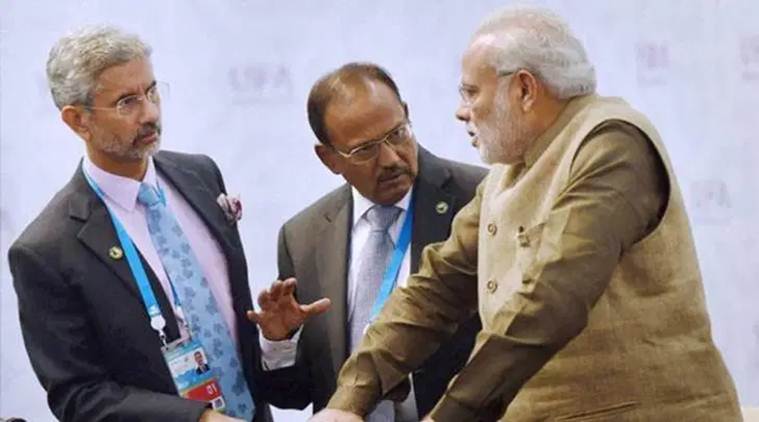 Prime Minister Narendra Modi with Minister of External Affairs S Jaishankar and NSA Ajit Doval. (File Photo)
Prime Minister Narendra Modi with Minister of External Affairs S Jaishankar and NSA Ajit Doval. (File Photo)
EIGHT weeks into the border stand-off, New Delhi is considering activating the Special Representative (SR) mechanism on the boundary talks.
Under this, National Security Advisor Ajit Doval could talk to his counterpart, China’s State Councillor and Foreign Minister Wang Yi, with the sole objective of “de-escalation” and “defusing” the situation, The Indian Express has learnt.
This comes amid tentative signs of a climbdown at some “friction points” five days after the Corps Commander-level talks agreed on a step-by-step de-escalation in eastern Ladakh.
Under this, both sides were supposed to withdraw manpower and structures and a verification was to be done July 5. “Teams from the Army did go to verify at some points where our forces are in a standoff.
Detailed reports will reach us only tomorrow but there is evidence of some withdrawal of manpower and dismantling of structures, at least in the Galwan area, ” a senior security establishment officer said. This has been recorded in the past three days, he said, adding that the progress is “tardy…not as desired”.
“We do not know if that’s intentional. The weather in the past few days has not been good. At Galwan, the river is in spate. That can make movement slower,” the officer said.
A Home Ministry official said that a timeline of about 10 days had been drawn keeping in mind what can be achieved each day with targets defined every three to five days.
“There may be a need to revise these timelines but at least some progress is being made in the Galwan region. That is the priority area for us,” the official said.
In Pangong Tso, including the area between Finger 4 and Finger 8, where the Chinese have ramped up their presence since May, de-escalation is still to be ascertained.
“As far as the build-up in Depsang is concerned, that is a matter of concern. Tangible results may take time given how talks play out,” the official said.
The SR-mechanism is being explored even as External Affairs minister S Jaishankar has spoken to Wang, in his capacity as Foreign minister.
This, sources said, is a “tool kit” New Delhi has to reach out to Beijing at a “higher level.” For, a State Councillor is higher than the Foreign Minister in the Chinese hierarchical system.
In India’s case, both Jaishankar and Doval are at the same level — both have Cabinet rank.
What is different on the Chinese side is that the Foreign Minister and the State Councillor (the Special Representative) is the same person since 2018. Until 2017, the Chinese Foreign minister and the State Councillor were different individuals.
In 2017, during the Doklam border stand-off, the Chinese State Councillor was Yang Jiechi — who was the Special Representative. That made it easier for Indian interlocutors as they could reach out to different people in the Chinese system.
Wang — who became the State Councillor and hence, the Special Representative — is much more powerful than he was in 2017.
This complicates the situation for New Delhi.
However, the thinking in South Block is that reaching out to him at a higher level — from the Chinese perspective — may work, and therefore activating the NSA-led SR-level mechanism is being considered.
The 22nd Meeting of the Special Representatives of India and China was held in New Delhi on December 21, 2019.
At that meeting, both Special Representatives had “agreed” that it is “important to maintain peace and tranquility in the border areas for the overall development of the bilateral relationship, pending final settlement of the boundary question”.
“There was a consensus that both sides should respect each other’s sensitivities and concerns in order to build mutual trust, as this was important for the future development of the bilateral relations,” the MEA statement had said then.
Prime Minister Narendra Modi Friday made a surprise visit to Ladakh and interacted with the Army and ITBP soldiers at Nimu post.
ITBP DG S S Deswal said: “The visit of the PM has boosted the morale of the forces. The complete national leadership, political leadership and the forces and jawans…they are dedicated to the nation and securing our borders.”